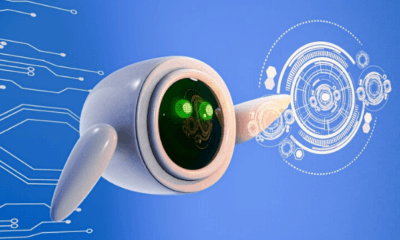AI
AI Regulation Impact Assessment Sample: Understanding the Process
Hope you are happy, dear readers! Welcome to an exciting journey into the realm of AI regulation impact assessments. In this article, we will delve into the intricacies of this crucial process, shedding light on how it shapes the landscape of artificial intelligence. From understanding the potential implications to evaluating the risks and benefits, an AI regulation impact assessment serves as a compass guiding policymakers and stakeholders in this ever-evolving technological landscape. So, grab a cup of coffee, sit back, and join us as we explore this fascinating subject. Without further ado, please continue reading.
Definition of AI regulation impact assessment
AI regulation impact assessment is a crucial process that evaluates the effects of implementing regulations on artificial intelligence technologies. It aims to ensure that AI systems are developed and used responsibly, while also promoting innovation and protecting societal interests.
The impact assessment process involves several steps:1. Identifying the regulatory objectives: This step involves defining the goals and objectives of the proposed AI regulation.
It is important to identify the specific areas of concern and the desired outcomes.2. Assessing the potential impacts: In this step, the potential impacts of the proposed regulation on AI technologies are evaluated.
This includes considering the effects on innovation, economic growth, privacy, security, and ethical considerations.3. Analyzing the risks and benefits: The risks and benefits associated with the proposed regulation are carefully analyzed.
This involves assessing the potential benefits of the regulation in terms of promoting trust, accountability, and fairness, while also considering the potential risks of stifling innovation or creating unintended consequences.
4. Consulting stakeholders: Engaging with stakeholders is an important part of the impact assessment process. This includes consulting with industry experts, AI developers, users, policymakers, and the public to gather diverse perspectives and ensure that all relevant voices are heard.
5. Developing mitigation strategies: Based on the findings of the impact assessment, mitigation strategies can be developed to address any identified risks or concerns.
This may involve modifying the proposed regulation, implementing safeguards, or providing support for affected stakeholders.6. Monitoring and evaluation: Once the regulation is implemented, ongoing monitoring and evaluation are necessary to assess its effectiveness and make any necessary adjustments.
This includes gathering feedback, measuring outcomes, and ensuring compliance with the regulation.By conducting AI regulation impact assessments, policymakers can make informed decisions about the development and implementation of AI regulations.
This helps to strike a balance between fostering innovation and addressing the potential risks and ethical considerations associated with AI technologies.
Visit our main page Tecmenu.com
Importance of AI regulation impact assessment
Artificial Intelligence (AI) has become an integral part of our lives, revolutionizing various industries and transforming the way we live and work. As this technology continues to advance at an unprecedented pace, it is crucial to recognize the importance of AI regulation impact assessment.
The rapid deployment of AI systems without proper evaluation can lead to unintended consequences and potential risks. Therefore, conducting comprehensive impact assessments is essential to ensure the responsible development and deployment of AI.
These assessments involve evaluating the potential social, economic, ethical, and legal implications of AI technologies, allowing policymakers and stakeholders to make informed decisions and implement effective regulations.
By taking proactive steps to assess the impact of AI, we can foster innovation while safeguarding against potential harms, promoting transparency, and ensuring that AI is used to benefit humanity as a whole.
Key stakeholders involved in AI regulation impact assessment
Key stakeholders involved in AI regulation impact assessment play a pivotal role in shaping the future of technology. From policymakers and industry leaders to ethicists and advocacy groups, the diverse perspectives they bring to the table ensure a balanced and comprehensive evaluation.
By engaging in collaborative dialogue, conducting thorough research, and considering societal implications, these stakeholders pave the way for responsible and effective AI regulation.
Their collective efforts strive to harness the potential of artificial intelligence while safeguarding against potential risks, ultimately driving innovation and progress in this rapidly evolving field.
Understanding the goals of AI regulation impact assessment
Understanding the goals of AI regulation impact assessment is crucial in today’s rapidly advancing technological landscape. As artificial intelligence continues to permeate various aspects of our lives, it becomes essential to evaluate its potential impacts and ensure responsible and ethical use.
AI regulation impact assessment aims to achieve three main goals: (1) Promoting Transparency and Accountability, (2) Safeguarding Human Rights and Privacy, and (3) Mitigating Potential Risks and Harms.
These goals serve as guiding principles in assessing the impact of AI regulations and ensuring that the development and deployment of AI systems align with societal values and interests.
Frameworks and methodologies used in AI regulation impact assessment
Frameworks and methodologies used in AI regulation impact assessment are essential for ensuring the ethical and responsible development of artificial intelligence technologies.
These frameworks provide a systematic approach to evaluating the potential risks and benefits associated with AI systems. Through comprehensive analysis and evaluation, they enable policymakers to make informed decisions and develop regulations that protect individuals’ rights and promote fairness.
By incorporating stakeholder engagement and interdisciplinary collaboration, these frameworks enhance transparency and accountability in AI governance.
They also facilitate the identification of potential biases and discriminatory practices, fostering the development of AI systems that are inclusive and unbiased.
Data collection and analysis in AI regulation impact assessment
Data collection and analysis play a crucial role in assessing the impact of AI regulation. Understanding its significance is key to effective implementation.
It helps identify potential risks, evaluate ethical implications, and inform policy decisions. By gathering and analyzing relevant data, policymakers can make informed choices that promote responsible AI development.
The process involves collecting data from various sources, applying statistical techniques, and drawing meaningful insights. This ensures a comprehensive assessment of AI’s societal impact, enabling regulators to create policies that balance innovation and protection.
Key challenges in conducting AI regulation impact assessment
The journey of AI regulation impact assessment is fraught with challenges, like navigating the ever-evolving landscape of technology and understanding its intricate impact on society.
Balancing innovation and ethical considerations while ensuring accountability poses a significant hurdle. Additionally, the global nature of AI necessitates harmonizing diverse regulatory frameworks, requiring a delicate balance to ensure both competitiveness and compliance.
Moreover, the dynamic nature of AI necessitates continual evaluation, adding complexity to the assessment process. Addressing these challenges is essential for fostering responsible and effective AI regulation.
Sayings Before You Go
In conclusion, the AI Regulation Impact Assessment process plays a crucial role in shaping the future of artificial intelligence. By evaluating the potential risks and benefits, policymakers can make informed decisions to ensure the responsible development and deployment of AI technologies.
This assessment provides a framework for addressing ethical considerations, accountability, and transparency, ultimately safeguarding society from potential harm.
As AI continues to advance at an unprecedented pace, it is essential for regulators to keep pace with these advancements and adapt regulations accordingly.
Goodbye to another intriguing article, and remember to share it with your friends. Thank you for reading!Understanding the AI Regulation Impact Assessment Process:1.
Evaluating the Risks and Benefits2. Addressing Ethical Considerations and Accountability
About The Author
AI
Artificial Intelligence Debate: Exploring the Pros and Cons for Society

Businessreign.com – Artificial intelligence (AI) has revolutionized various aspects of our lives, from the smartphones we carry to the cars we drive. While AI has undoubtedly brought about significant advancements, it has also sparked a heated debate about its overall impact on humanity.
The Benefits of Artificial Intelligence
Proponents of AI highlight numerous advantages that this technology offers to society. These include:
- Enhanced Efficiency and Productivity: AI automates repetitive tasks, freeing up human workers to focus on more complex and creative endeavors. This automation streamlines processes, increases output, and reduces costs across various sectors.
- Improved Decision-Making: AI algorithms can analyze vast amounts of data to identify patterns, trends, and anomalies that humans might miss. This capability enables better-informed decisions in areas such as healthcare, finance, and risk assessment.
- Personalized Experiences: AI tailors products, services, and content to individual preferences and needs. This personalization enhances user experiences, improves customer satisfaction, and drives engagement.
- Advanced Scientific Research: AI accelerates scientific breakthroughs by analyzing complex data, generating hypotheses, and conducting simulations. This contribution drives progress in fields like medicine, materials science, and environmental research.
The Concerns Surrounding Artificial Intelligence
Despite its undeniable benefits, AI raises concerns that have fueled a debate about its overall impact on society. These concerns include:
- Job Displacement: AI automation raises fears of widespread job losses, particularly in industries reliant on repetitive tasks. This displacement could lead to economic hardship and social unrest.
- Algorithmic Bias: AI algorithms can perpetuate existing biases in the data they are trained on. This bias can lead to discriminatory outcomes in areas like hiring, loan applications, and criminal justice.
- Privacy and Security Risks: AI systems collect and analyze vast amounts of personal data, raising concerns about privacy breaches and misuse of information. This data can be exploited for surveillance, manipulation, and identity theft.
- Loss of Control and Ethical Dilemmas: The increasing sophistication of AI raises concerns about human control over these systems. Ethical dilemmas arise when AI makes decisions that have significant consequences for individuals and society.
Navigating the Future of AI
As AI continues to evolve, it is crucial to address both its potential benefits and its associated risks. Governments, businesses, and individuals must collaborate to ensure that AI is developed and used responsibly, ethically, and for the betterment of society.
Conclusion
AI is a powerful tool that has the potential to transform our world for the better. However, it is essential to approach AI with caution and foresight, ensuring that its development and application align with human values and societal well-being. By carefully navigating the pros and cons of AI, we can harness its power to create a future that benefits all of humanity
About The Author
AI
The Double-Edged Sword: Exploring the Pros and Cons of Artificial Intelligence

Businessreign.com – Artificial intelligence (AI) has permeated nearly every aspect of our lives, from the smartphones we carry to the cars we drive. While AI has undoubtedly brought about significant advancements, it has also sparked a heated debate about its overall impact on humanity.
The Benefits of Artificial Intelligence
Proponents of AI highlight numerous advantages that this technology offers to society. These include:
- Enhanced Efficiency and Productivity: AI automates repetitive tasks, freeing up human workers to focus on more complex and creative endeavors. This automation streamlines processes, increases output, and reduces costs across various sectors.
- Improved Decision-Making: AI algorithms can analyze vast amounts of data to identify patterns, trends, and anomalies that humans might miss. This capability enables better-informed decisions in areas such as healthcare, finance, and risk assessment.
- Personalized Experiences: AI tailors products, services, and content to individual preferences and needs. This personalization enhances user experiences, improves customer satisfaction, and drives engagement.
- Advanced Scientific Research: AI accelerates scientific breakthroughs by analyzing complex data, generating hypotheses, and conducting simulations. This contribution drives progress in fields like medicine, materials science, and environmental research.
The Concerns Surrounding Artificial Intelligence
Despite its undeniable benefits, AI raises concerns that have fueled a debate about its overall impact on society. These concerns include:
- Job Displacement: AI automation raises fears of widespread job losses, particularly in industries reliant on repetitive tasks. This displacement could lead to economic hardship and social unrest.
- Algorithmic Bias: AI algorithms can perpetuate existing biases in the data they are trained on. This bias can lead to discriminatory outcomes in areas like hiring, loan applications, and criminal justice.
- Privacy and Security Risks: AI systems collect and analyze vast amounts of personal data, raising concerns about privacy breaches and misuse of information. This data can be exploited for surveillance, manipulation, and identity theft.
- Loss of Control and Ethical Dilemmas: The increasing sophistication of AI raises concerns about human control over these systems. Ethical dilemmas arise when AI makes decisions that have significant consequences for individuals and society.
Navigating the Future of AI
As AI continues to evolve, it is crucial to address both its potential benefits and its associated risks. Governments, businesses, and individuals must collaborate to ensure that AI is developed and used responsibly, ethically, and for the betterment of society.
Conclusion
AI is a powerful tool that has the potential to transform our world for the better. However, it is essential to approach AI with caution and foresight, ensuring that its development and application align with human values and societal well-being. By carefully navigating the pros and cons of AI, we can harness its power to create a future that benefits all of humanity.
About The Author
AI
Artificial Intelligence Debate: Exploring the Pros and Cons for Society

Businessreign.com – Artificial intelligence (AI) has permeated nearly every aspect of our lives, from the smartphones we carry to the cars we drive. While AI has undoubtedly brought about significant advancements, it has also sparked a heated debate about its overall impact on humanity.
The Benefits of Artificial Intelligence
Proponents of AI highlight numerous advantages that this technology offers to society. These include:
- Enhanced Efficiency and Productivity: AI automates repetitive tasks, freeing up human workers to focus on more complex and creative endeavors. This automation streamlines processes, increases output, and reduces costs across various sectors.
- Improved Decision-Making: AI algorithms can analyze vast amounts of data to identify patterns, trends, and anomalies that humans might miss. This capability enables better-informed decisions in areas such as healthcare, finance, and risk assessment.
- Personalized Experiences: AI tailors products, services, and content to individual preferences and needs. This personalization enhances user experiences, improves customer satisfaction, and drives engagement.
- Advanced Scientific Research: AI accelerates scientific breakthroughs by analyzing complex data, generating hypotheses, and conducting simulations. This contribution drives progress in fields like medicine, materials science, and environmental research.
The Concerns Surrounding Artificial Intelligence
Despite its undeniable benefits, AI raises concerns that have fueled a debate about its overall impact on society. These concerns include:
- Job Displacement: AI automation raises fears of widespread job losses, particularly in industries reliant on repetitive tasks. This displacement could lead to economic hardship and social unrest.
- Algorithmic Bias: AI algorithms can perpetuate existing biases in the data they are trained on. This bias can lead to discriminatory outcomes in areas like hiring, loan applications, and criminal justice.
- Privacy and Security Risks: AI systems collect and analyze vast amounts of personal data, raising concerns about privacy breaches and misuse of information. This data can be exploited for surveillance, manipulation, and identity theft.
- Loss of Control and Ethical Dilemmas: The increasing sophistication of AI raises concerns about human control over these systems. Ethical dilemmas arise when AI makes decisions that have significant consequences for individuals and society.
Navigating the Future of AI
As AI continues to evolve, it is crucial to address both its potential benefits and its associated risks. Governments, businesses, and individuals must collaborate to ensure that AI is developed and used responsibly, ethically, and for the betterment of society.
Conclusion
AI is a powerful tool that has the potential to transform our world for the better. However, it is essential to approach AI with caution and foresight, ensuring that its development and application align with human values and societal well-being. By carefully navigating the pros and cons of AI, we can harness its power to create a future that benefits all of humanity.
About The Author

 Business9 months ago
Business9 months agoMaster Business Planning: Essential Guide for Aspiring Entrepreneurs

 Business9 months ago
Business9 months agoBusiness Innovation: Top Idea Generation Techniques for Entrepreneurs

 Business9 months ago
Business9 months agoOldest private members’ clubs London: Historical Gems

 tech11 months ago
tech11 months agoNvidia Neuromorphic Chip: Advancing AI Technology
- AI9 months ago
Should AI Be Banned: Pros, Cons, and the Future of Education

 Business9 months ago
Business9 months agoFamous private clubs in London: Renowned Establishments

 Artificial Intelligence9 months ago
Artificial Intelligence9 months agoArtificial Intelligence Is a Threat to Humanity: Debate Points

 Artificial Intelligence9 months ago
Artificial Intelligence9 months agoIs Artificial Intelligence Good for Society? A Balanced Debate Essay

